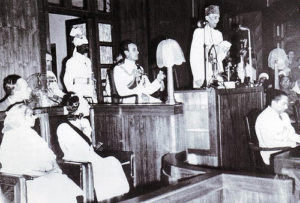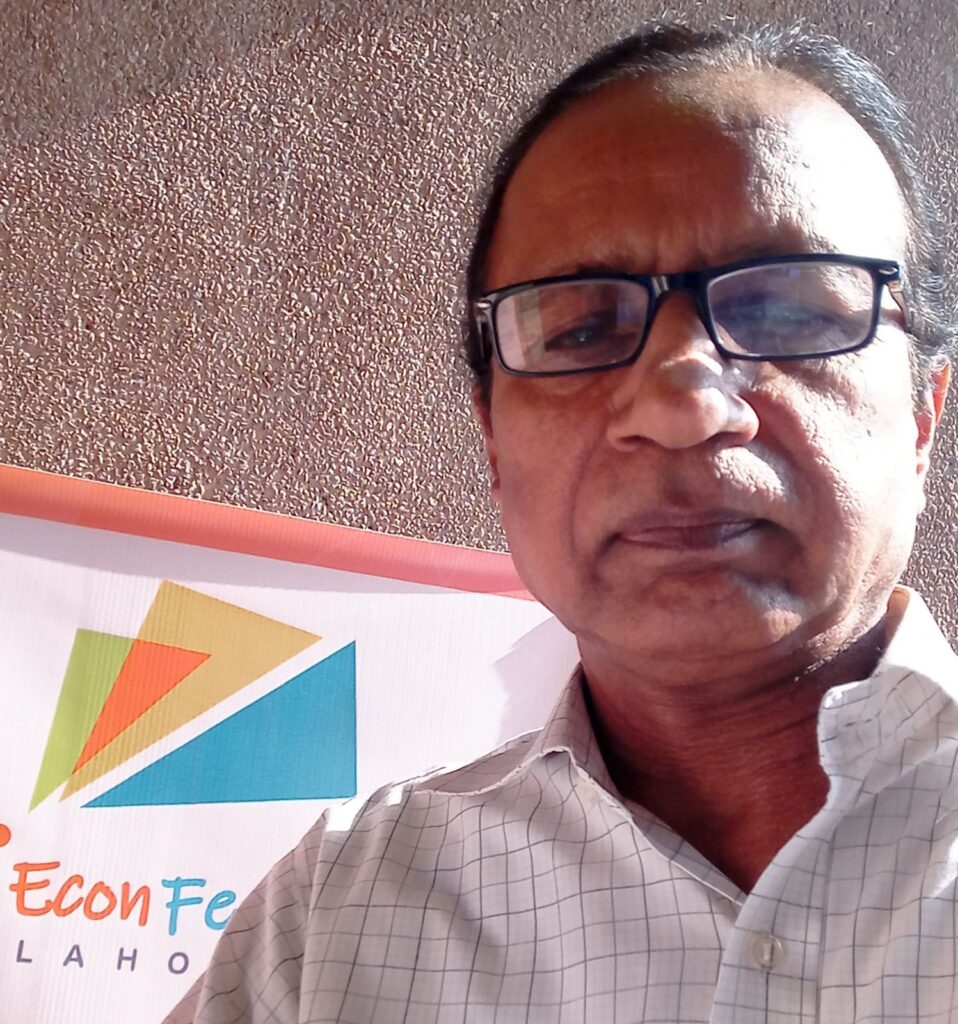Since long, a controversy has been raging as to what kind of state Quaid-i-Azam Mohammad Ali Jinnah wanted Pakistan to be: a religious state or a secular state. Fortunately, that controversy precludes certain extremes, for instance, it is generally understood and admitted that Quaid never wanted Pakistan to be a theocratic or a socialist state. That amounts to saying that the controversy focuses mainly on whether it was an “Islamic” state or a “secular” state that Quaid may have envisioned.

That controversy has its roots in what Quaid himself said, that is, the speeches and addresses he delivered on various occasions. Both of the camps quote and cite inconsistent statements and argue for their case. That’s what makes the controversy complicate manifold.
Apart from such dishonesties with the help of which concocted statements are attributed to Quaid; or out of the context meanings are drawn from his statements; or this or that part of a long and complex statement is made use of damaging the purport of the whole of it; or any such ploy; there has been such attempts which aim at bringing an order in whatever Quaid said by categorizing what did he say officially and what did he say unofficially. That puts what is most important at the top, and decides in favor of them.
Also, there have been attempts at resolving the conflicting views, but that too leaves much room for any camp free to strengthen its case.
From the vantage point of an impartial observer, another way that may help resolve the controversy is this: As is the case with higher courts judges that when they are confronted with the task of interpreting this or that point of law, besides going into the intricacies of arguments put forward by parties concerned and the available precedents, in order to know what that point of law amounts to, they need to deliberate what was the intention of those who made that law. That helps know the purport of the law and thus the point of law under consideration finds a context where its resolution reaches a satisfactory conclusion.
For the resolution of the controversy, the same method may be had recourse to; that is, trying to know the intention of Quaid may help to know what kind of state he envisioned Pakistan to be: a religious state, or a secular state, or some other type of state.
But again, for that to seek, categorization needs to be brought back to help us. It is herein that, in view of the writer, one camp enjoys an edge over the other. The camp who makes Quaid’s 11 August (1947) Address to the Constituent Assembly basis of its arguments is far better positioned, since it is this Address that may be termed envisioning the future state of Pakistan at a platform that was entrusted with the making of the future constitution for the country. It is official to the extent something may be official! And, it’s no ordinary speech, it is Presidential Address to the Constituent Assembly, and it was delivered by Quaid in the capacity of this Constituent Assembly’s first president, and the points Quaid delineated in it were meant to be used as guidelines for the making of the constitution.
As the controversy traversed along, the Pakistani state, not awaiting the resolution of it, kept moving ahead albeit with no clear vision and no sense of direction, as if someone was wading through a dark alley stumbling here and there. In the midst of that, Pakistan turned into a jelly state susceptible to the maneuverings of stronger groups or those who were in collusion with stronger groups; and that helped power politics to make (sort of permanent) inroads in Pakistan.
That is why, that controversy was never made part of the politics pursued in Pakistan; at best it remained sort of an intellectual controversy, though pregnant with significant political implications for the nature of the Pakistani state.
It is in this context, that the writer believes that this controversy must be a part of and must be made part of the politics in Pakistan, if Pakistan has to move forward with a clear sense of direction and Pakistani state is to be brought back from the capture of the state aristocracy, i.e. Riyasati Ashrafiya, to the service of all the citizens without any discrimination!
Hence, in view of the above, as it is said it’s never too late to mend, it may now be demanded that Quaid’s 11 August (1947) Address be made substantive part of the constitution in a manner that guides the constitution to be amended accordingly; and, let this demand be part of the election manifestoes of this or that political party, or any parties, or their constitution, so that one of the major issues on which the next general elections are going to be contested stands out as: Quaid’s Address be made substantive part of the Pakistan constitution!
It is the present writer’s considered opinion that one effective way in which the controversy may find its resolution is to let this Quaid’s Address be part of the politics and let it be part of the next general elections campaign and let the people vote for it and thus let this 11 August (1947) speech of Quaid be a substantive part of the constitution.
That will bring the controversy regarding the nature of the Pakistani state from the intellectual into the political realm. And, hopefully, that will help resolve not only the controversy but the basic principles of a state/government also, which Quaid himself laid down in this Address of his. Here are the ‘guidelines’ in Quaid’s own words and his own order as far as making of the constitution was concerned.

- The first observation that I would like to make is this. You will no doubt agree with me that the first duty of a Government is to maintain law and order, so that the life, property and religious beliefs of its subjects, are fully protected by the State.
- We must put that (‘bribery and corruption, black-marketing, nepotism and jobbery’) down with an iron hand and I hope that you will take adequate measures as soon as it is possible for this Assembly to do so.
- Now, if we want to make this great State of Pakistan happy and prosperous we should wholly and solely concentrate on the well-being of the people, and especially of the masses and the poor.
- If you will work in co-operation, forgetting the past, burying the hatchet, you are bound to succeed. If you change your past and work together in a spirit that ever, one of you, no matter to what community he belongs, no matter what relations he had with you in the past, no matter what is his colour, caste or creed, is first, second and last a citizen of this State with equal rights, privileges and obligations, there will be no end to the progress you will make.
- I cannot emphasise it too much. We should begin to work in that spirit and in course of time all these angularities of the majority and minority communities – the Hindu community and the Muslim community because even as regards Muslims you have Pathans, Punjabis, Shias, Sunnis and so on and among the Hindus you have Brahmins, Vashnavas, Khatris, also Bengalese, Madrasis and so on -will vanish. Indeed if you ask me this has been the biggest hindrance in the way of India to attain its freedom and independence and but for this we would have been free peoples long long ago. No power can hold another nation, and specially a nation of 400 millions, souls in subjection; no body could have conquered you, and even if it had happened, no body could have continued its hold on you for any length of time but for this (Applause). Therefore we must learn a lesson from this. You are free; you are free to go to your temples, you are free to go to your mosques or to any other places of worship in this State of Pakistan. You may belong to any religion or caste or creed – that has nothing to do with the business of the State. (Hear, hear)
- As you know, history shows that in England conditions some time ago were much worse than those prevailing in India to-day. The Roman Catholics and the Protestants persecuted each other. Even now there are some States in existence where there are discriminations made and bars imposed against a particular class. Thank God we are not starting in those days. We are starting in the days when there is no discrimination, no distinction between one community and another, no discrimination between one caste or creed and another. We are starting with this fundamental principle that we are all citizens and equal citizens of one Stale. (Loud applause)
- Now, I think we should keep that in front of us as our ideal and you will find that in course of time Hindus would cease to be Hindus and Muslims would cease to be Muslims, not in the religious sense, because that is the personal faith of each individual, but in the political sense as citizens of the State.
- Well, gentlemen, I do not, wish to take up any more of your time and thank you again for the honour you have done to me. I shall always be guided by the principles of justice and fair-play without any, as is put in the political language, prejudice or ill-will, in other words partiality or favouritism. My guiding principle will be justice and complete impartiality, and I am sure that with your support and co-operation, I can look forward to Pakistan becoming one of the greatest Nations of the world. (Loud applause)
Note: Quaid’s words have been copied from the original records available at the National Assembly of Pakistan.

